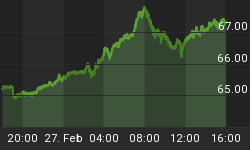I know we were all told that it was not supposed to happen, but interest rates are rising on both U.S. government debt and mortgages. Fortunately for investors, market forces are not subjugated by media's groupthink. Therefore, I was able to predict and profit from this nascent move up in rates, despite being vilified by those who told me that rates had already priced in the removal of government support.
But it's not only the removal of Fed purchases of Mortgage Backed Securities (MBS) that are sending rates higher. I believe the move higher in mortgage rates presages a higher cost of money across the yield spectrum, due to rising concerns about inflation.
The Fed's program of buying $1.25 trillion in MBS caused rates to fall to 4.71% in December of 2009. However, since their departure from the market, thirty year fixed mortgage rates have already jumped to 5.21% last week, which was the highest level in nearly eight months and up from 5.08% in the week prior.
Unfortunately, this is just the beginning of interest rate woes as we now see the warning signs of burgeoning inflation all around us.
The Institute of Supply Management's prices paid index surged in March from 67 to 75, oil prices are up 65% in the last 12 months and gold has reached a 4 month high as it creeps back towards its all time high of just over $1,200 per ounce. Even base metals such as copper and iron ore have seen their prices surge recently. But for the Fed theses warning signs are just things to ignore. Instead of dealing with our inflation problem they are choosing to seek refuge in the stubbornly high unemployment rate and the troubles in Greece. However, people sitting home and being unproductive in the U.S. or in Greece cannot obviate the need for the Fed to eventually deal with their mandate of providing stable prices.
Unlike his counterparty in Australia Glenn Stevens, who recently raised rates to 4.25%, Ben Bernanke seems undaunted by the warning signs all around him. In a speech he made in Dallas last week he said this, "The economy has stabilized and is growing again, although we can hardly be satisfied when 1 out of every 10 U.S. workers is unemployed and family finances remain under great stress." And if investors still need further conviction regarding the dovish mindset of Mr. Bernanke there's this, "We have yet to see evidence of a sustained recovery in the housing market. Mortgage delinquencies...continue to rise as do foreclosures." He is correct about the real estate market. Lender Processing Services (LPS) data released today showed mortgage delinquencies rose to 10.2% and foreclosure inventories reached a record high 3.31%!
Of course what's most troubling is that none of Bernanke's concerns have anything to do with inflation.
Not to be out done, New York Fed President William Dudley said on April 7th that the Fed Funds rate "needs to be exceptionally low for an extended period to contribute to easier financial conditions to support economic activity." What these Phillips Curve thinkers believe is that a weak economy along with falling home prices equates to deflation. The truth is that those factors can lead to deflation but are not deflation in of themselves.
It is clear that the Fed isn't moving anywhere on rates in the near term. However, market forces are taking rates up on the long end of the curve. Rates are being pushed higher by three forces; the superficial recovery in the economy -- which is prompting investors to cease seeking shelter in the bond market, a tsunami of supply issuance and a credible concern of an increasing inflationary threat.
While I am concerned about a rising rate of inflation, I do not believe that inflation will become intractable in the short term. That is precisely because rising rates will have a severe and detrimental impact on our over-indebted economy. Therefore, the rise in the cost of money will be mollified by the renewed weakness in GDP. Inflation will only grow massive if and when the Fed decides to deploy a quantitative easing policy to keep government debt service manageable. The Fed must eventually decide if they will inflate our debt away or allow the economy to collapse. History has proven that they will choose the path of monetization.















